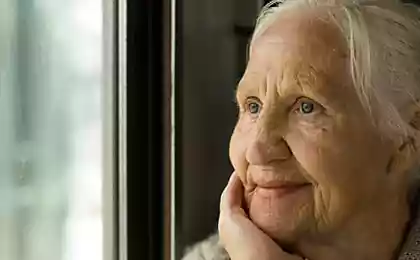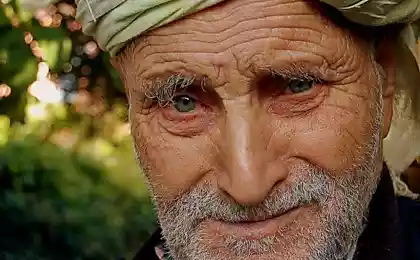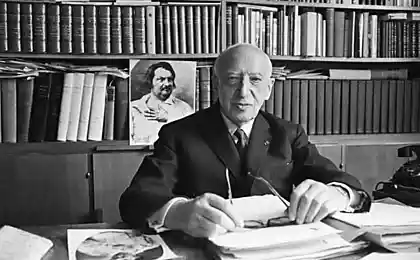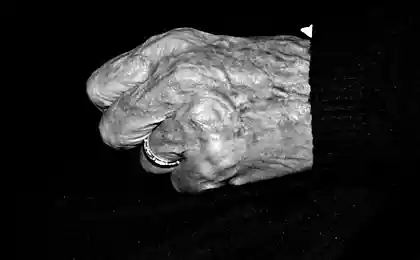576
Age-related changes not so sad!
Starting with the so-called middle age, the body increasingly difficult to cope with daily stress, physical and sometimes mental abilities gradually weaken. In developed countries the average life expectancy is more than 70 years. Actually a person can live 120 years, but it is hampered by failures in various body systems that occur in the second half of life.
Age-related changes lead to chronic and, in some cases, fatal diseases. The most vulnerable cardiovascular, digestive, excretory, nervous and reproductive system. Common "age-related" diseases are Alzheimer's, osteoarthritis, cancer, diabetes, depression and coronary heart disease.
The peak of growth and maturation of the human body is approximately 25 years. Then comes adulthood and aging — a natural process following a rapid bloom of youth.

Some age-related changes are hard, but not always transform a person into a feeble old man. Features of the aging process determined by health status, lifestyle and genetic predisposition.
With age often occur following changes:
Causes and symptoms
There are several theories explaining the aging process. In each case the leading role is given to a particular factor (or their combination).
1. Programmed aging ("the theory of the biological clock").
Cell aging are programmed at the genetic level. The number of possible divisions laid down once and for all. When cells begin to die off faster, than to recover bodies no longer cope with their vital functions.
2. Genetic theory.
In cells there are substances, destroying them at the chromosomal level.
3. The structural theory.
With age, deteriorating connective tissue: due to the fact that it becomes less sturdy and elastic occur irreversible changes.
4. The free radical theory of aging.
The most popular theory, according to which the result of chemical reactions in cells generates free radicals that cause damage and cell death. Over time, the number of dead and non-functional cells is increasing. Because of this disrupted the entire body.
5. Immunological theory.
With age, the immune system wears out. The body becomes more vulnerable to infectious diseases and disorders that, in the end, lead to death. In addition, due to the weakening of the immune system triggered an autoimmune reaction: the body recognizes its own cells as foreign and destroys them himself.
Diagnosis
Age-related changes associated with various diseases. Common methodology to identify them no, but the patient examination, General and biochemical blood tests help to identify problem areas. In older people the disease is at first often occur were obliterated. Examination obligatorily in the presence of such symptoms:
Treatment
Doctors almost always prescribe symptomatic treatment of diseases associated with age. Approximately two-thirds of people older than 65 years (among them more women than men) are turning to drugs. Older people often take painkillers, diuretics, tranquilizers and psychotropic drugs and medicines from cardiovascular disease and antibiotics.
Women in postmenopausal women to relieve symptoms of age-related changes typically assigned to the hormone replacement therapy (HRT) with estrogens. In addition often also prescribed the progesterone. It is proven that HRT helps to preserve mental abilities.
Expected results
Aging is inevitable but senility can be avoided. Even in old age people can continue to lead an active lifestyle. In order to prevent or relieve the symptoms of chronic diseases, support for family, friends and doctors, as well as proper nutrition, healthy lifestyle and the ability to cope with stress.
Alternative therapies
Nutritional supplements
Older people are advised to take high-quality vitamin-mineral complexes. In old age there is often a deficiency of b vitamins, vitamins A and C, folic acid, calcium, magnesium, zinc, iron, chromium and other trace elements. Since old age reduces the production of gastric juice, it is better to take vitamins in gelatin capsules that are easily digested. Some vitamin complexes contain enzymes to improve digestion.
Antioxidants help to repair the damage caused by free radicals in the body, which is considered one of the causes of aging. Antioxidants are also useful for the prevention and treatment of cancer, glaucoma and cataract surgery.
The list of substances which are antioxidants:
Hormones
Listed below hormonal drugs are used for prophylaxis and treatment of diseases associated with aging. Before use, be sure to consult with a specialist.
Dehydroepiandrosterone normalizes hormonal balance, helps to restore muscle mass, strengthen bone tissue and prevent heart disease.
Melatonin is used to treat insomnia, sexual dysfunction, viral and bacterial infections. Taking this hormone reduces the risk of cardiovascular disease and cancer.
Somatotropin (growth hormone) normalizes the level of glucose in the blood, strengthens bone, cartilage and muscle tissue, helps to burn fat.
Herbal
Garlic (Allium sativa) is used for the prevention and treatment of diseases of the heart, improves the color and condition of the skin. Garlic normalizes the liver and digestive system, lowers blood pressure.
Siberian ginseng ( Eleutherococcus senticosus ) stimulates the adrenal glands and the immune system. There is evidence that it helps to eliminate issues caused by stress. Siberian ginseng enhances mental and physical activity, prevents memory loss, chronic fatigue syndrome and immune dysfunction.
A source of proanthocyanidins are pine bark, seeds and skins of grapes. These substances are useful for the prevention of cancer and diseases of the eye.
In Ayurveda, ageing is due to the fact that the man begins to dominate the Vata dosha- the driest of the three doshas (fundamental life force). The person loses weight, loses fluid, it becomes more nervous, restless and fearful, complains of poor sleep and appetite. To correct this condition use foods (bananas, almonds, avocado, coconut) and herbal remedies Gotu-Kola, or metalistic (Centella asiatica) strengthens the immune system and restoring normal functioning of the nervous system and brain cells. Metalistic used to treat reduced memory, anxiety and insomnia.
In Chinese medicine aging is due to a lack of energy Yin. Older people should have "moisturizing products". These include millet, barley soup, tofu, mixed beans, wheat, spirulina, potatoes, black sesame seeds, walnuts, flax seed. You can apply the tonic ingredients: extract of deer antler, dodder seeds, sprouts, Chinese Foxglove, "longevity soup", mussels and chicken.
Prevention
To increase life expectancy and improve its quality in old age need to eat right, lead an active lifestyle, avoid stress and give up bad habits. Exercise strengthens bone tissue, improves the appetite, digestion, mental wellbeing and blood circulation.
Drinking large amounts of fluid allows you to maintain healthy skin, good digestion and timely removal from the body decay products. In the day you should drink up to 8 glasses of water, along with herbal teas, diluted fruit and vegetable juices, eat fresh vegetables and fruits with high liquid content.
Due to the weakening of the taste buds of the elderly is often added to food a greater quantity of salt. This leads to increased blood pressure and deficiency of nutrients in the body. Sugar consumption also increases. As substitutes for sugar you can use seaweed and honey (in small amounts).
Alcohol, nicotine and caffeine are potentially dangerous, therefore they must be partially or completely avoided.
Recommended foods rich in fiber, but low in fat, and complex carbohydrates (e.g. cereals). If it is difficult to chew, consume more drinks, containing proteins, milk porridge, fresh fruit and vegetable juices.published
P. S. And remember, only by changing their consumption — together we change the world! ©
Join us in Facebook , Vkontakte, Odnoklassniki
Source: www.moscowuniversityclub.ru/home.asp?artId=10150
Age-related changes lead to chronic and, in some cases, fatal diseases. The most vulnerable cardiovascular, digestive, excretory, nervous and reproductive system. Common "age-related" diseases are Alzheimer's, osteoarthritis, cancer, diabetes, depression and coronary heart disease.
The peak of growth and maturation of the human body is approximately 25 years. Then comes adulthood and aging — a natural process following a rapid bloom of youth.

Some age-related changes are hard, but not always transform a person into a feeble old man. Features of the aging process determined by health status, lifestyle and genetic predisposition.
With age often occur following changes:
- Hearing loss (particularly affects the perception of high tones).
- The increase in the amount of adipose tissue relative to muscle (ratio could rise by almost 30%). The layer of subcutaneous fat, previously evenly distributed throughout the body, now thinner and the fat accumulates in the abdomen. A person loses the ability to rapidly consume fats (including cholesterol and fat-soluble substances), and they begin to accumulate in the body.
- Reduction of water content in the body. This leads to deterioration of suction water-soluble substances. The body produces less saliva and other hydrating liquids.
- The deterioration of the liver and kidneys. Because of this, begin to accumulate harmful metabolic products.
- The deterioration of the digestion due to reduced production of gastric juice.
- The weakening of the muscles, poor coordination, decreased mobility, agility and flexibility.
- The decrease in production of sex hormones, loss of sexual function.
- The gradual weakening of taste and smell.
- Changes in the cardiovascular and respiratory systems lead to a deterioration in the delivery of oxygen and nutrients to various organs and body systems.
- The deterioration of the nervous system. The brain signals are passed not so effectively. Reflexes slow down, worsening memory and ability to perceive new information.
- A decrease in bone density and bone strength.
- A gradual decline in hormone production, especially thyroid and sex glands.
- Blurred vision, increase the risk of eye diseases (e.g. macular degeneration).
- The deterioration of natural production of vitamin D under the action of sunlight.
- The decrease in the formation of proteins, reduced bone and muscle mass, increased risk of osteoporosis.
Causes and symptoms
There are several theories explaining the aging process. In each case the leading role is given to a particular factor (or their combination).
1. Programmed aging ("the theory of the biological clock").
Cell aging are programmed at the genetic level. The number of possible divisions laid down once and for all. When cells begin to die off faster, than to recover bodies no longer cope with their vital functions.
2. Genetic theory.
In cells there are substances, destroying them at the chromosomal level.
3. The structural theory.
With age, deteriorating connective tissue: due to the fact that it becomes less sturdy and elastic occur irreversible changes.
4. The free radical theory of aging.
The most popular theory, according to which the result of chemical reactions in cells generates free radicals that cause damage and cell death. Over time, the number of dead and non-functional cells is increasing. Because of this disrupted the entire body.
5. Immunological theory.
With age, the immune system wears out. The body becomes more vulnerable to infectious diseases and disorders that, in the end, lead to death. In addition, due to the weakening of the immune system triggered an autoimmune reaction: the body recognizes its own cells as foreign and destroys them himself.
Diagnosis
Age-related changes associated with various diseases. Common methodology to identify them no, but the patient examination, General and biochemical blood tests help to identify problem areas. In older people the disease is at first often occur were obliterated. Examination obligatorily in the presence of such symptoms:
- loss of appetite
- confusion
- urinary incontinence
- dizziness
- the weight loss
- down
Treatment
Doctors almost always prescribe symptomatic treatment of diseases associated with age. Approximately two-thirds of people older than 65 years (among them more women than men) are turning to drugs. Older people often take painkillers, diuretics, tranquilizers and psychotropic drugs and medicines from cardiovascular disease and antibiotics.
Women in postmenopausal women to relieve symptoms of age-related changes typically assigned to the hormone replacement therapy (HRT) with estrogens. In addition often also prescribed the progesterone. It is proven that HRT helps to preserve mental abilities.
Expected results
Aging is inevitable but senility can be avoided. Even in old age people can continue to lead an active lifestyle. In order to prevent or relieve the symptoms of chronic diseases, support for family, friends and doctors, as well as proper nutrition, healthy lifestyle and the ability to cope with stress.
Alternative therapies
Nutritional supplements
Older people are advised to take high-quality vitamin-mineral complexes. In old age there is often a deficiency of b vitamins, vitamins A and C, folic acid, calcium, magnesium, zinc, iron, chromium and other trace elements. Since old age reduces the production of gastric juice, it is better to take vitamins in gelatin capsules that are easily digested. Some vitamin complexes contain enzymes to improve digestion.
Antioxidants help to repair the damage caused by free radicals in the body, which is considered one of the causes of aging. Antioxidants are also useful for the prevention and treatment of cancer, glaucoma and cataract surgery.
The list of substances which are antioxidants:
- Vitamin E (daily rate — 400-1000 IU). Protects cell membranes from damage. May help to prevent Alzheimer's and Parkinson's.
- Selenium (recommended dose, 50 mg 2 times a day). Might reduce the risk of cancer.
- Beta-carotene (daily rate — 25000-40000 IU). Used as an adjuvant for the treatment of cancer, colds, flu, arthritis and for strengthening the immune system.
- Vitamin C (1000-2000 mg a day). In large doses can cause diarrhea. If you have side effects reduce dosage.
- Other useful supplements for age-related diseases:
- Vitamins B12/V. According to studies, vitamin В12улучшает memory and eliminates mental problems (confusion and depression).
- Coenzyme Q10. Effective for the treatment of heart disease. 3/4 of patients with heart disease are deficient of this enzyme.
Hormones
Listed below hormonal drugs are used for prophylaxis and treatment of diseases associated with aging. Before use, be sure to consult with a specialist.
Dehydroepiandrosterone normalizes hormonal balance, helps to restore muscle mass, strengthen bone tissue and prevent heart disease.
Melatonin is used to treat insomnia, sexual dysfunction, viral and bacterial infections. Taking this hormone reduces the risk of cardiovascular disease and cancer.
Somatotropin (growth hormone) normalizes the level of glucose in the blood, strengthens bone, cartilage and muscle tissue, helps to burn fat.
Herbal
Garlic (Allium sativa) is used for the prevention and treatment of diseases of the heart, improves the color and condition of the skin. Garlic normalizes the liver and digestive system, lowers blood pressure.
Siberian ginseng ( Eleutherococcus senticosus ) stimulates the adrenal glands and the immune system. There is evidence that it helps to eliminate issues caused by stress. Siberian ginseng enhances mental and physical activity, prevents memory loss, chronic fatigue syndrome and immune dysfunction.
A source of proanthocyanidins are pine bark, seeds and skins of grapes. These substances are useful for the prevention of cancer and diseases of the eye.
In Ayurveda, ageing is due to the fact that the man begins to dominate the Vata dosha- the driest of the three doshas (fundamental life force). The person loses weight, loses fluid, it becomes more nervous, restless and fearful, complains of poor sleep and appetite. To correct this condition use foods (bananas, almonds, avocado, coconut) and herbal remedies Gotu-Kola, or metalistic (Centella asiatica) strengthens the immune system and restoring normal functioning of the nervous system and brain cells. Metalistic used to treat reduced memory, anxiety and insomnia.
In Chinese medicine aging is due to a lack of energy Yin. Older people should have "moisturizing products". These include millet, barley soup, tofu, mixed beans, wheat, spirulina, potatoes, black sesame seeds, walnuts, flax seed. You can apply the tonic ingredients: extract of deer antler, dodder seeds, sprouts, Chinese Foxglove, "longevity soup", mussels and chicken.
Prevention
To increase life expectancy and improve its quality in old age need to eat right, lead an active lifestyle, avoid stress and give up bad habits. Exercise strengthens bone tissue, improves the appetite, digestion, mental wellbeing and blood circulation.
Drinking large amounts of fluid allows you to maintain healthy skin, good digestion and timely removal from the body decay products. In the day you should drink up to 8 glasses of water, along with herbal teas, diluted fruit and vegetable juices, eat fresh vegetables and fruits with high liquid content.
Due to the weakening of the taste buds of the elderly is often added to food a greater quantity of salt. This leads to increased blood pressure and deficiency of nutrients in the body. Sugar consumption also increases. As substitutes for sugar you can use seaweed and honey (in small amounts).
Alcohol, nicotine and caffeine are potentially dangerous, therefore they must be partially or completely avoided.
Recommended foods rich in fiber, but low in fat, and complex carbohydrates (e.g. cereals). If it is difficult to chew, consume more drinks, containing proteins, milk porridge, fresh fruit and vegetable juices.published
P. S. And remember, only by changing their consumption — together we change the world! ©
Join us in Facebook , Vkontakte, Odnoklassniki
Source: www.moscowuniversityclub.ru/home.asp?artId=10150























